Читать книгу The Legal Position of the Clergy - Philip Vernon Smith - Страница 26
На сайте Литреса книга снята с продажи.
Оглавление2. The original connection of advowsons or rights of presentation with manors or estates[37] led to their passing by devolution or devise on death, or by gift or sale during life, to the heir of the patron, or to a devisee, donee, or purchaser of the manor or estate; and it soon became recognised in law that they could be alienated by themselves like any other property, apart from the manors to which they were originally appendant. Moreover, until 1899 the law allowed a patron to grant or sell the right of next presentation, or the right of presentation during his lifetime, or any other limited interest in the patronage, reserving the fee-simple of the advowson to himself. By an Act of 1713,[38] a clergyman was prohibited from purchasing a next presentation and then presenting himself; but this has been held not to prevent him from presenting himself after purchasing an estate in fee, or even an estate for life in the advowson.[39] And if the benefice is vacant at the time of the transfer, the transfer does not carry with it the right to present a clerk to fill up the existing vacancy.[40] This, however, was, until 1899, frequently got over by an agreement that the transferor should present such clerk as the transferee might nominate. But the Benefices Act, 1898,[41] introduced several salutary restrictions on the transfer of advowsons. Under sect. 1 of that Act:—
(a) A transfer of an advowson (otherwise than on marriage, death, or bankruptcy, or on the appointment of a new trustee) is invalid unless it (i.) transfers the whole interest of the transferor in the advowson (except that he may reserve to himself a life interest in making a family settlement, and the equity of redemption in making a mortgage); (ii.) is made more than twelve months after the last filling up of the benefice; and (iii.) is registered in the diocesan registry within one month after its date, or such extended period as the bishop may under special circumstances permit.
(b) The advowson must not be put up to auction unless sold with a manor or not less than 100 acres of land belonging to the same owner in the same or an adjoining parish.
(c) Subsection (3) of the same section also makes invalid any agreement to exercise patronage in favour of or on the nomination of a particular person, and also, in connection with the transfer of an advowson, any agreement (i.) to retransfer the advowson; (ii.) to postpone payment of any part of the purchase money, or to pay interest until a vacancy in the living, or for more than three months; (iv.) to make any payment in respect of the date at which the vacancy may occur; or (v.) that the living shall be resigned in favour of any person. If the patron of a benefice is a Roman Catholic, the University of Oxford or of Cambridge has the right to present.[42] A Jew who owns an advowson may present; but if a Jew holds an office under the Crown to which a right of presentation is attached, the right passes to the Archbishop of Canterbury.[43]
